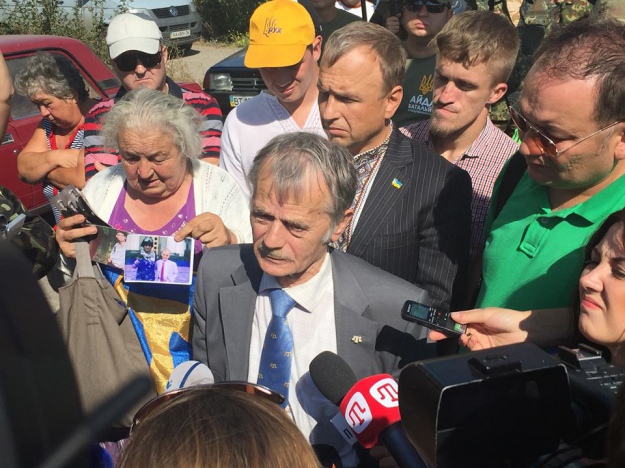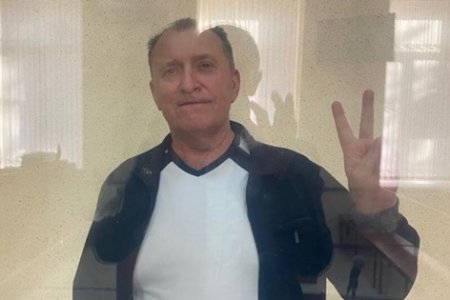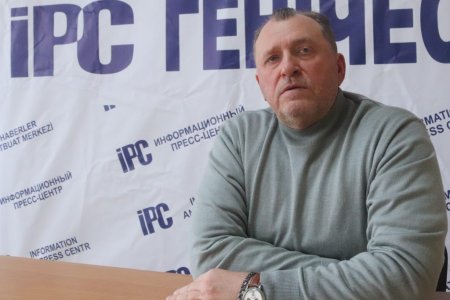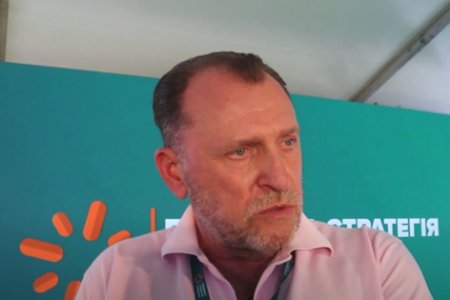
Alim Veliliaev was abducted from occupied Kherson oblast on 11 July, with the Russian invaders accusing the 54-year-old Crimean Tatar with involvement in the perfectly legal Civic Blockade of Crimea in 2015-2016. This may herald an alarming extension of Russia’s already mass persecution of Crimean Tatars and other Ukrainians abducted from territory seized after Russia’s full-scale invasion of Ukraine.
The Russian FSB accuse Veliliaev, under Article 208 § 2 of Russia’s criminal code, of having, in 2015-16, ‘taken part in an unlawful armed formation on Ukrainian territory whose activities are banned on the territory of the Russian Federation.” The only element of truth in this legally nihilistic nonsense is that the activities referred to took place of Ukrainian territory. It was Ukrainian during the years in question and remains so now, making Russia’s actions in abducting Veliliaev and ‘charging’ him with actions on territory over which it can have no jurisdiction, entirely illegal.
Since the alleged ‘activities’ began in 2015, the FSB are presumably accusing Veliliaev of involvement in the Civic Blockade of Crimea. This was initiated by Crimean Tatar leaders in September 2015 and initially had specific human rights demands, including Russia’s release of all Crimean Tatar and other Ukrainian political prisoners. Until those demands were met, veteran Crimean Tatar leader Mustafa Dzhemilev said, there must be “no business as usual” with Russian-occupied Crimea. Various Ukrainian organizations joined in an indefinite blockade of the occupied peninsula. Each of the three crossings into Crimea (Chonhar, Chaplinka and Kalanchak) was blocked to all trucks, although cars and individuals on foot were allowed through. Later, the blockade was extended to include electricity. The FSB are claiming that Veliliaev took part in guarding the administrative crossing at Chonhar, to block trucks carrying goods to occupied Crimea.
It should be stressed that such a civic blockade was only needed because Ukraine’s government had stopped the flow of Dnipro water to occupied Crimea, yet failed to do anything to stop economic business and supplies of electricity. The Blockade ended on 16 January 2016 when Ukraine’s Cabinet of Ministers belatedly issued a resolution, banning goods supplies to the occupied peninsula.
In early 2016, Crimean Tatar businessman and civic activist Lenur Islyamov founded the Asker, or Noman Çelebicihan Battalion, with its members sharing the patrol of the crossings into occupied Crimea with Ukrainian border guards. Despite its name, the Battalion was an unarmed civic organization which was legal in Ukraine.
On 1 June 2022, Russia’s Supreme Court declared the Battalion, which had largely ceased to exist, a ‘terrorist organization’ and banned it on the territory of Russia or occupied Crimea. There were no grounds for the ruling against a peaceful organization with wanting the deoccupation of Crimea and preventing Russia from ‘enjoying business as usual’ while occupying Ukrainian territory hardly constituting ‘terrorism’ or, indeed, any crime.
The FSB began arrests on charges of involvement in the Battalion in early 2018, with almost no information ever provided about the individuals taken prisoner. The number of such prosecutions sharply increased after Russia’s full-scale invasion with several victims being abducted from occupied parts of Kherson oblast or when they tried to visit relatives in Crimea.
Since there is no mention of the Battalion, and Veliliaev is facing charges over activities from 2015, it would appear that Russia is not specifically accusing him of involvement in the Noman Çelebicihan Battalion. It remains to be seen whether they try to claim that he was part of another Ukrainian organization which Russia ‘has banned’, or whether the FSB are seriously planning to argue that the peaceful Civic Blockade was ‘an unlawful armed formation….”.
Not one of the men thus far abducted and then, later, imprisoned on Battalion charges has been acquitted, with all such ‘trials’ and long sentences very clear politically commissioned. The same, unfortunately, almost certainly applies in the case of 54-year-old Alim Veliliaev.



